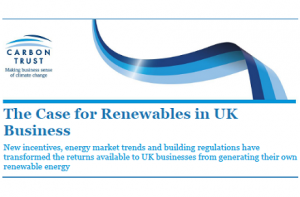Carbon Trust Advisory analysis has found that businesses which invest in renewable energy could make average returns of 11-12%, with the potential for returns in excess of 20%. According to the findings, new financial incentives, energy market trends and building regulations are combining to create a compelling case for UK businesses to generate their own renewable energy.
 |
| [relatedPosts title=”Related Posts”] |
|
|
With energy prices set to grow by up to 37% by 2020, the opportunity to reduce utility bills is a strong incentive for investigating renewable energy options. Government initiatives such as Renewable Heat Incentive (RHI) and Feed in Tariff (FiT), which are also designed to act as incentives for businesses to act quickly and benefit from the capped level of funding on offer.
Anaerobic digestion (AD), wind, biomass heating systems and ground source heat pumps are some of the most attractive and practical renewable energy technologies for UK businesses, the report reveals. AD grid injection and biomass boilers offer the highest average internal rate of return. However, there is a wide variance in returns from renewable energy, with different factors determining the overall effectiveness of the different methods on an individual basis. These factors include whether a company should purchase or directly generate renewable energy; whether to adopt on or offsite projects, levels of internal expertise and the implications through an organisation’s extended supply chain.
As part of the project, the Carbon Trust Advisory conducted interviews with leading companies to find out about the challenges, opportunities and best practice associated with implementing renewable energy measures. The industries with the most to gain are utilities, manufacturing, retail, hospitality and agricultural sectors.
Retailers and consumer goods brands are tending to lead the way. ASDA, IKEA, John Lewis and Marks & Spencer have all set a target of moving to 100% renewable energy. The Carbon Trust Advisory analysis of the results shows that businesses are taking a mixed approach to sourcing renewable energy from either their own projects or purchases from energy providers. One business which has made strong progress in this area is IKEA. The furniture retailer now obtains 80% of its total energy use for renewable and has invested in a mix of ground source heat pumps, biomass, solar panels and wind power.
Charlie Browne, IKEA UK and Ireland Sustainability Manager, explains: “Taking care of people and the environment is integral to how we do business, so we are continually working to significantly reduce our carbon footprint from all parts of our operations. As part of our global ‘IKEA Goes Renewable’ programme, we are committed to heavily investing in making IKEA buildings more energy efficient and using more renewable energy. For example, our most recently built UK based stores in Coventry, Southampton and Dublin have been designed to incorporate measures that will have a major impact on these areas, including geothermal heating and cooling systems, biomass boilers and improved insulation. Our recent investment into a 12.3 Megawatt wind farm in Aberdeenshire and a £4million investment to fit over 39,000 photovoltaic (solar) panels to the rooftops of 10 IKEA stores shows our clear actions to reach our goal of 100% renewable energy supply.”
Commenting on the report, Hugh Jones, Managing Director, Carbon Trust Advisory, said:
“This report should help convince more UK businesses to move to renewable energy. However, selecting the right strategy for renewable energy can be a complex area and we recommend that businesses make a staged approach to adoption. This includes trialling different measures, testing their viability and doing this sooner rather than later before energy price increases and regulatory pressure become more pressing.”
The case for renewables in UK business – A paper from the Carbon Trust Advisory Services (CTA004) is available here.
The Carbon Trust has published guides to many aspects of the low carbon economy, including more detailed and operational guides to implementing renewable energy measures and understanding the UK policy landscape. Their guides are available here.




